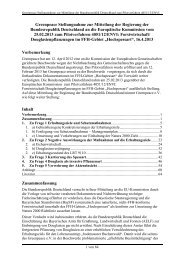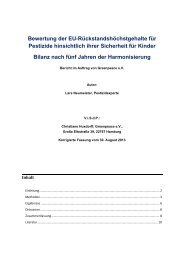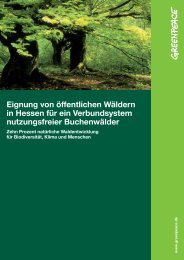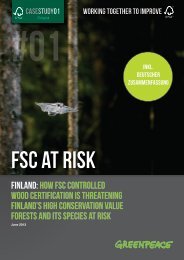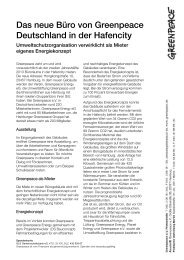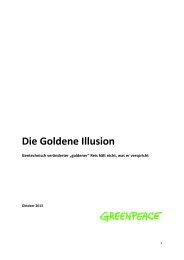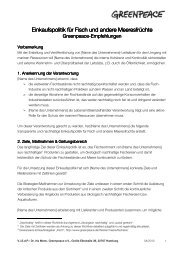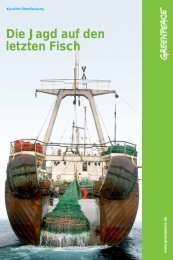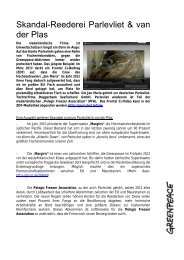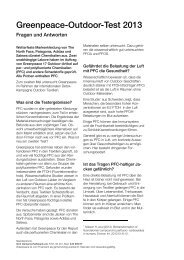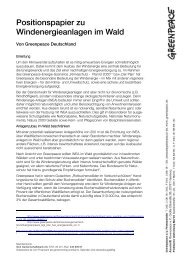Untitled - Greenpeace
Untitled - Greenpeace
Untitled - Greenpeace
You also want an ePaper? Increase the reach of your titles
YUMPU automatically turns print PDFs into web optimized ePapers that Google loves.
CARVING UP THE CONGO 23<br />
[I]n spite of the moratorium<br />
a gross 15 million hectares<br />
were reportedly exchanged<br />
or relocated. These<br />
transactions reflect the<br />
weight of the interests<br />
involved.’ 106<br />
World Bank-led forestry<br />
sector review, 2007<br />
point, while the Forestry Code does recognise<br />
the rights of forest dwelling communities in the<br />
process of allocating new areas of forest, they<br />
will effectively be marginalised by the legal<br />
review due to inadequate consultation with no<br />
appropriate mechanisms to resolve outstanding<br />
conflicts. This is left to the development of<br />
forest management plans, which companies<br />
have four years to prepare.<br />
Fundamentally, in the context of the DRC – as<br />
elsewhere in Africa – focusing primarily on the<br />
raising of state revenue through industry<br />
reform does not create the necessary<br />
preconditions to bring genuine development<br />
because it does not tackle corruption.<br />
THE MORATORIUM HAS FAILED TO PREVENT<br />
MILLIONS OF HECTARES OF LOGGING TITLES<br />
BEING AWARDED<br />
As the numbers show (see pp82–85), the<br />
moratorium – while intended to allow time<br />
for the development of a more considered,<br />
coherent and effective approach to the<br />
management of the DRC’s forest resource –<br />
has failed to clamp down on the allocation of<br />
new forest titles.<br />
Right from the start of the moratorium in May<br />
2002, ‘interest groups began to undermine the<br />
reform strategy by taking advantage of the<br />
fragile coalition government’. 107 As a result,<br />
industrial logging rights have continued to be<br />
granted. The official list published in November<br />
2005 includes 100 forestry contracts signed<br />
after the moratorium began, covering a total<br />
of 15 million hectares. 108<br />
How have logging companies and officials<br />
allowed this violation of the law to happen?<br />
A World Bank-led forestry sector review<br />
identifies various irregularities. For instance:<br />
‘Companies reportedly relinquished forests<br />
they found non-productive or they had already<br />
logged over, but in some cases these lowvalue<br />
forests were exchanged for new ones.<br />
Thirty-two contracts covering 4.6 million<br />
hectares were reportedly awarded in 2003<br />
under the guise of such “remapping” or<br />
“exchange” of old titles. Similar transactions<br />
seem to have continued in 2004 and 2005<br />
under the guise of “readjustments” and<br />
“relocations”.’ 109<br />
While such ‘exchanges’ do not necessarily<br />
increase the total area under title, they are in<br />
all but name, new titles. They open up new<br />
areas of forest to logging with all the<br />
associated impacts, without proper land use<br />
planning, without transparency, without open<br />
and competitive allocation, and without<br />
consideration to other forest uses (see NST<br />
case study below). The review also notes that<br />
across these 32 titles ‘there appears to be a<br />
discrepancy of more than 1 million hectares’<br />
between the forest area described in the titles<br />
and the boundaries drawn on the maps<br />
attached to them. 110 Another irregularity<br />
identified by the World Bank-led forestry<br />
sector review is the ‘rehabilitation’ of at least 7<br />
titles that were cancelled in 2002, covering<br />
2.4 million hectares.<br />
This information, available in a recent joint<br />
World Bank report to which the World Bank<br />
contributed, 111 leads to two important<br />
conclusions. Firstly, that the scale of the<br />
problem is massive (whatever the actual area<br />
of forest involved). And secondly, that it is<br />
impossible for anyone other than the World<br />
Bank, the Independant Observer – overseeing<br />
the legal review of logging titles pre- or postmonatorium<br />
– and the DRC Government to<br />
make considered judgement of the situation<br />
due to the opacity with which information<br />
relating to the industry is presented (for<br />
instance, the failure to name logging<br />
companies or to present maps). Throughout<br />
the reform process, no maps have been made<br />
publicly available by either the DRC<br />
Government or the Independent Observer,<br />
further obstructing efforts to expose<br />
moratorium violations through improved<br />
transparency.<br />
A report funded by the UK Department for<br />
International Development alleges that many<br />
of the logging titles allocated following the<br />
moratorium have represented a valuable<br />
‘currency’ to members of the political elite. 112<br />
Hence, in the absence of enforcement – either<br />
by the appropriate State authorities, or through<br />
other forms of action against those profiting<br />
from corruption – foreign companies have not<br />
only benefited from but clearly reinforced the<br />
political corruption that has controlled the<br />
DRC’s resources throughout its history.



